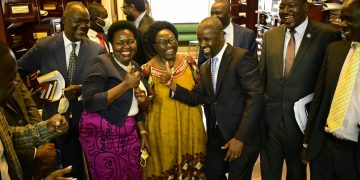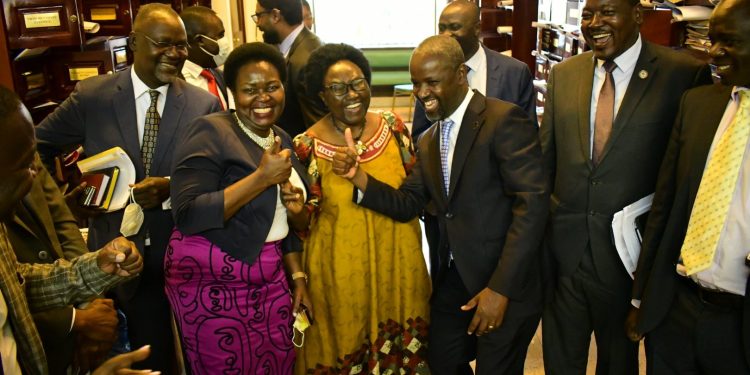The 11th Parliament, has approved the East African Crude Oil Pipeline (EACOP) Bill to pave way for the full implementation of the oil pipeline project in Uganda.
The law will facilitate the implementation of Uganda’s obligations under the Host Government Agreement signed between Uganda, Tanzania and the East African Crude Oil Pipeline Company Ltd.
Passed during the plenary chaired by the deputy speaker Anita Among on Thursday afternoon, the bill will enable the implementation of the local content and ensure that Ugandan citizens and enterprises are given priority when it comes to labor and other resources.
Sixteen categories of goods and services such as transportation, security, hotel accommodation and catering, and civil works are reserved for Ugandans.
Ruth Nankabirwa, the Minister of Energy and Mineral Development notes that the approved legislation includes different proposals from the Opposition following the harmonization committee set up by the Deputy Speaker.
The approved piece of legislation also provides for the tariff regime applicable to the project during the different phases of operation such as construction and operation period, ensures that the EACOP project obtains the required authorizations in a timely manner, grant and protect the rights of the project land including enabling the government to support the project in the acquisition of land and others.
The law will also enable the government and the Uganda National Oil Company to pay the transportation tariff in kind.
According to Emmanuel Otaala, Chairperson of the Environment and Natural Resources Committee of Parliament, payment in kind is the use of crude oil as payment for transportation tariff and related services.
Among commended MPs and the Opposition leadership in parliament for standing out during the consideration of the Bill.
The Host Government Agreement makes the enactment of enabling legislation a pre-condition for its effectiveness.
Without the approval of the EACOP Bill, the Host Government Agreement would not be fully effective and it would not be possible to fully implement the oil pipeline project in Uganda.
The lnter-Governmental Agreement (lGA) is the foundation of the oil pipeline project and marked the decision for both Uganda and Tanzania to embark on developing the longest electrically heated crude oil export pipeline in the world.
These will be implemented alongside the Shareholders Agreement, which details obligations and shareholders structures, and the Tariff and Transportation Agreement between the Pipeline Company and the Shippers of Uganda’s crude oil.
The first commercial oil production in Uganda is projected to start in 2025, roughly two decades after commercially viable oil deposits were discovered. Once fully developed, the 1,443-kilometre EACOP will transport crude oil from the fields throught Buliisa, Hoima, Nwoya, Kikuube districts to Chongoleani terminal in Tanga at the Indian Ocean coast in Tanzania.
Uganda’s section of the pipeline project is about 296 kilometers running through 10 districts, 25 sub-counties, 172 villages, and affecting at least 4,121 persons. Construction works are expected to start in the second quarter of 2022 in Tanzania where acquisition of land for project right of way is fast-moving.
The project is expected to cost USD 3.8 billion (13 trillion Shillings) pooled through the EACOP holding company that is co-owned by the oil companies Total E&P and China National Offshore Oil Company (CNOOC) and the governments of Tanzania and Uganda through the national oil companies. URN









